
1
Story Information
2
Share
Share Link
Spread the word on your favorite platforms.
Story Statistics
2,345 Reads
80 Shares
320 Likes
Related Stories
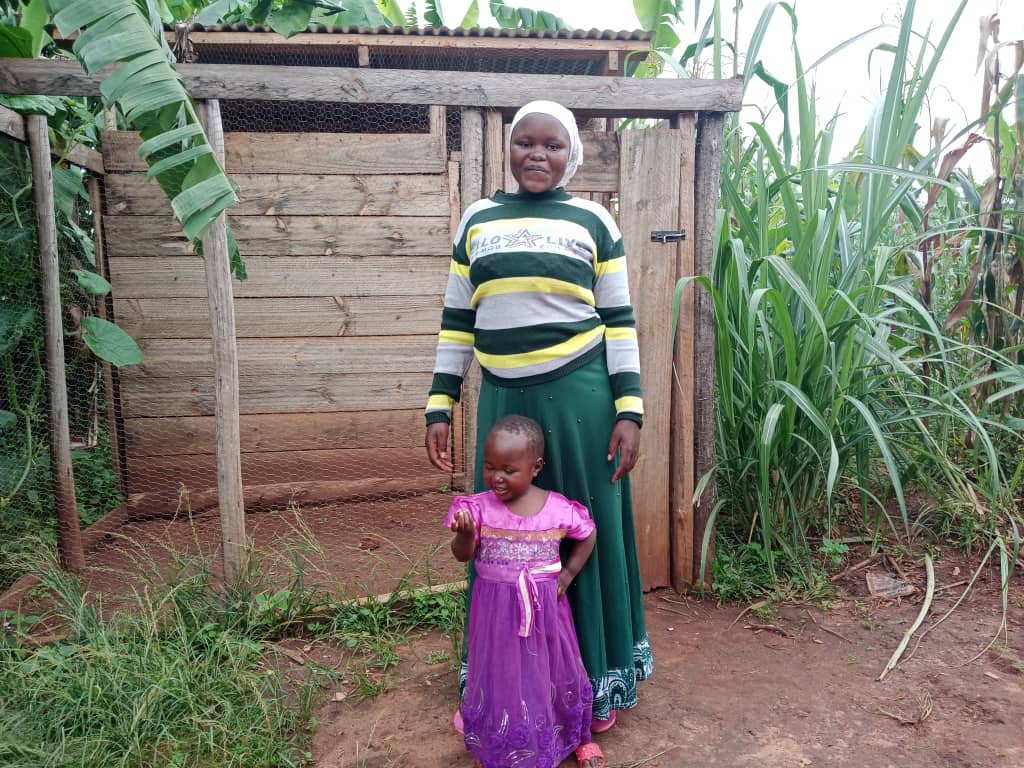
1 year ago
The Power Behind the Reaching Children’s Potential Program: Parents!
Around the world, parents, especially mothers, play a critical role in preventing malnutrition and supporting the growth and development of their children. Before birth, mothers’ nutrition, health practices, and mental well-being impact the development of their babies in utero. In infancy and childhood, by supplying nutritious food, modeling good hygiene habits, and supporting cognitive development via play and stimulation, parents can ensure their children reach their full potential. Although the RCP program provides instrumental support and education to improve health and nutrition outcomes in the Ukwega Ward, it is a parent-driven effort – impossible without the enthusiastic participation of RCP mothers and fathers!
Supported by RCP Caregivers and volunteers, parents are the primary implementers of the RCP program components. They attend educational workshops, prepare nutritious food for their children, and use and maintain household technologies like handwashing stations, Earthboxes, chicken coops, and fuel-efficient stoves. Involvement in the RCP Program requires significant time and effort, but parents enjoy participating in the program and are enthusiastic about the positive changes they have experienced. RCP parent Inueni Ngalembula from Mkalanga village reported that she regularly participates in RCP activities like home visits, monthly weighing of her baby, preparing nutritious meals, and caring for the RCP technologies. When asked about her favorite RCP activities, Inueni said “I enjoy participating in [workshops] because I learn a lot of new things that have grown my capacity, ability, and knowledge on childcare and parenting as well.” Inueni has also seen a positive impact on her children and mentioned that nutrition education, healthcare, and technologies “…have positively impacted our ability to get vegetables from our home garden and has made it easy for us to get food…it has helped my children be in [a] good health condition.”
RCP mother Angela Ngalembula from Mkalanga feels that the RCP Program has “…enabled me as a mother…through seminars which I have been attending at the RCP Centre as well as home visits where I receive knowledge transfer from caregivers. The seminars have been so good to my family [especially] nutritional education…I did not have the knowledge before regardless of all the nutritional sources that are found within our localities and how to use them it was a challenge to me but through Global Volunteers’ education offered through workshops has [improved].” Angela’s favorite RCP activity is the monthly measurement because “…it helps me to know the progress of my children in whatever stage they are in and where to put [the most effort] to make sure they truly meet their full potential.” She also reports that educational workshops on hygiene have helped her family to be free from stomach diseases and that the practice of handwashing has had a positive impact on their life.
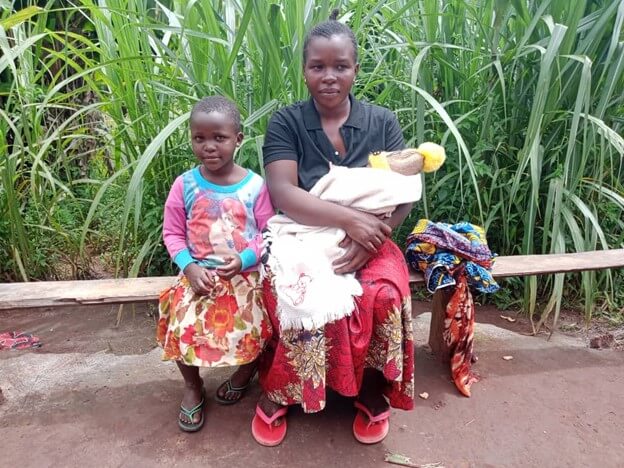
Jenifa Kikoti from Mkalanga regularly attends home visits, workshops, and monthly measurements and is responsible for maintaining her family’s RCP household technologies including a chicken coop, Earthboxes, and a handwashing station. Jenifa stated “I have enjoyed all RCP activities but the most enjoyable activity to me is taking care of technologies because it’s a direct impact you can see. I take care of the earth boxes by watering them. I’m enjoying the vegetables…as well as the chicken coops. I know sometime later I will be harvesting protein from chickens.” Jenfia also described the impact of the RCP Program on her children “…using the knowledge I acquire from the workshops, especially that of hand washing and hygiene to improve sanitation around my home has reduced the frequency of illness for my children…my newborn has fewer visits to the health facilities because he doesn’t have stomach illness like his [older] brothers.”
Parent participation in the RCP Program has a positive impact on children’s physical health but it also can support children’s mental development and form positive habits and emotional health. Global Volunteers’ RCP Caregiver Supervisor Thekla Mushi highlighted this important role saying, “It is important for the parents to be involved and participate in the RCP Program…both fathers and mothers can provide consistent and positive messages to their child. This can help a child to have a sense of security and support, which can accelerate the child’s overall well-being. Parents’ involvement is very important at every stage of child development for the betterment of future generations.”
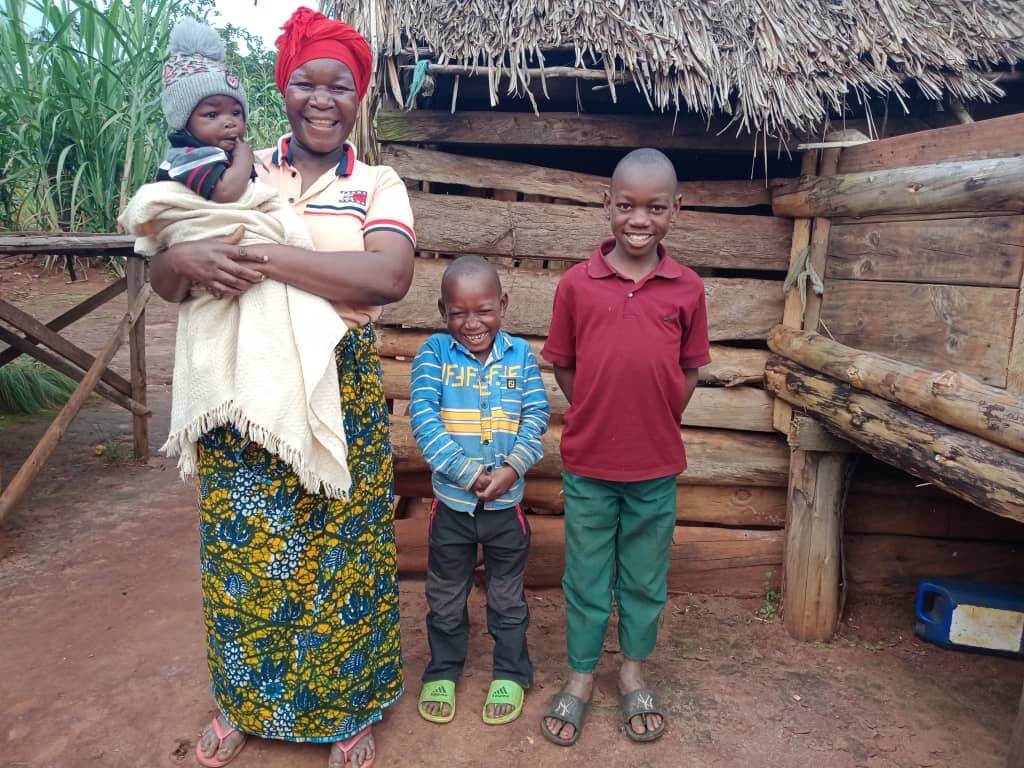
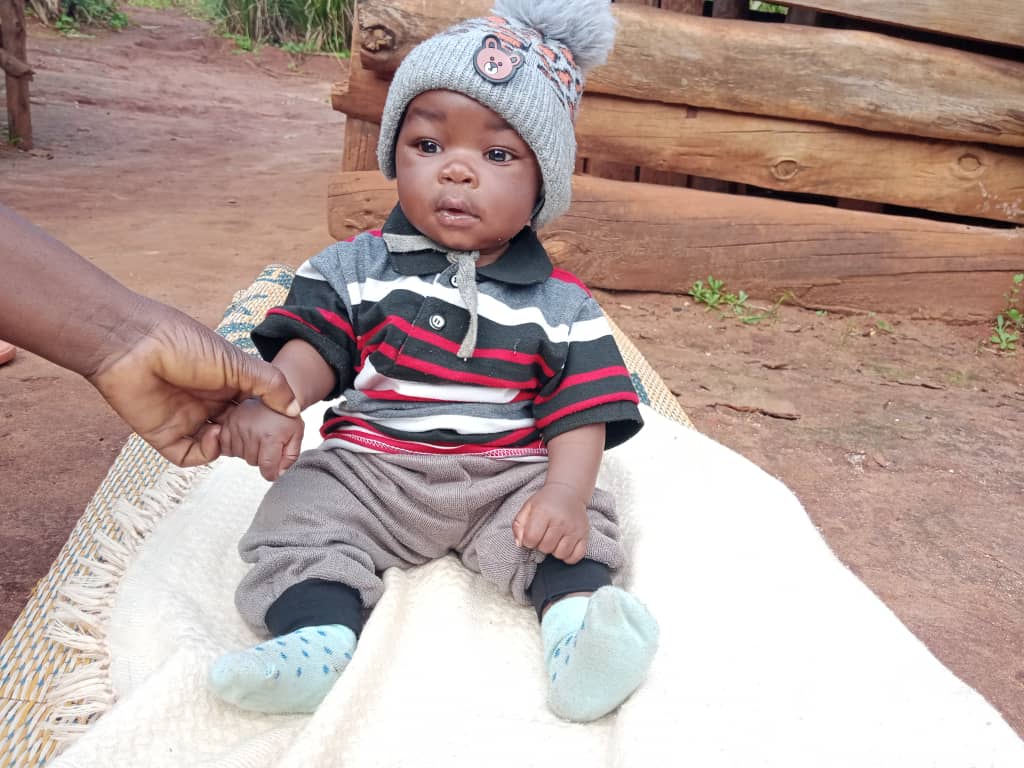
Parents in the Ukwega Ward have already made incredible progress. Since the beginning of the RCP Program in 2017, stunting prevalence among RCP children has dropped from 37% at baseline to 16% – a 57% reduction in the number of stunted children. By volunteering in Tanzania or donating, you can support the RCP Program and provide RCP parents with the resources and support needed to continue the challenging but rewarding work of transforming their children’s futures.
Become a Global Volunteer in Tanzania! Request information here >>The History of the Reaching Children’s Potential Program from Anse-la-Raye to Ipalamwa
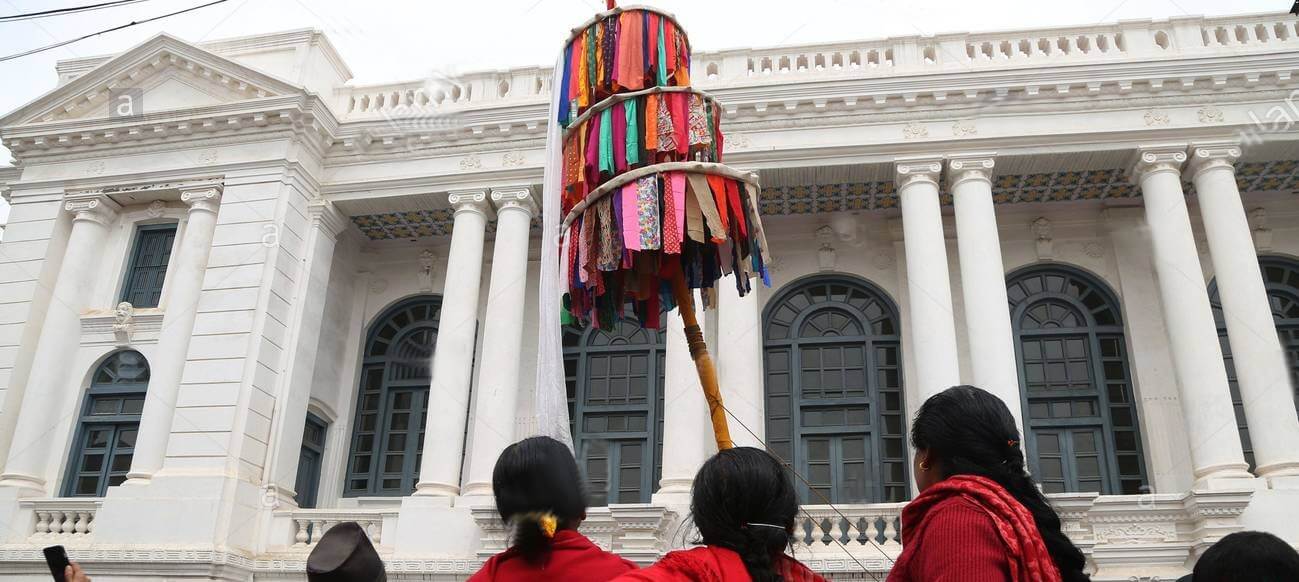
1 year ago
Celebrating The “Holi” Festival – Kathmandu, Nepal!
The Holi festival, known as “Phagu Purnima” in Nepali, is named after the mythical demoness Holika, and is one of the most anticipated annual celebrations in Nepal. A three-day festival of color and joy, Holi is observed on the full moon day, which falls either late February or early March. If you’re fortunate enough to serve on our Nepal Program during Holi, you can celebrate with the youth and staff of the DR Memorial school and children’s home, and participate in events with adults and children in the wider community. Kathmandu surely takes on a new look during Holi!
People observe the first festival day by decorating wooden poles and burning them through the night to symbolize the burning of the old year. The erection of a chir (sacred pole) symbolises the tree on which Hindu deity Krishna is said to have hung milkmaids’ clothes while they were bathing in the Jamuna River in India. The women dress in red saris and circle the poles praying for blessings. The custom originated in the Basantapur Durbar Area of Kathmandu, and today the chir is decorated with colorful cloth, reminding the people to prepare for the upcoming celebrations.
On the second day, bonfires are lit to symbolize the death of the demon Holika, which signifies good winning over bad. According to mythology, the “devil king,” Hiranyakashyap forced everyone to worship him, however his son Prahlad did not. He was loyal to Lord Vishnu. Hiranyakashyap plotted with his daughter Holika to kill Prahlad by walking through a burning fire. (Holika had been blessed with a resistance to fire) however, due to his devotion to Lord Vishnu, Prahlad survived while his sister Holika was burned to ashes!
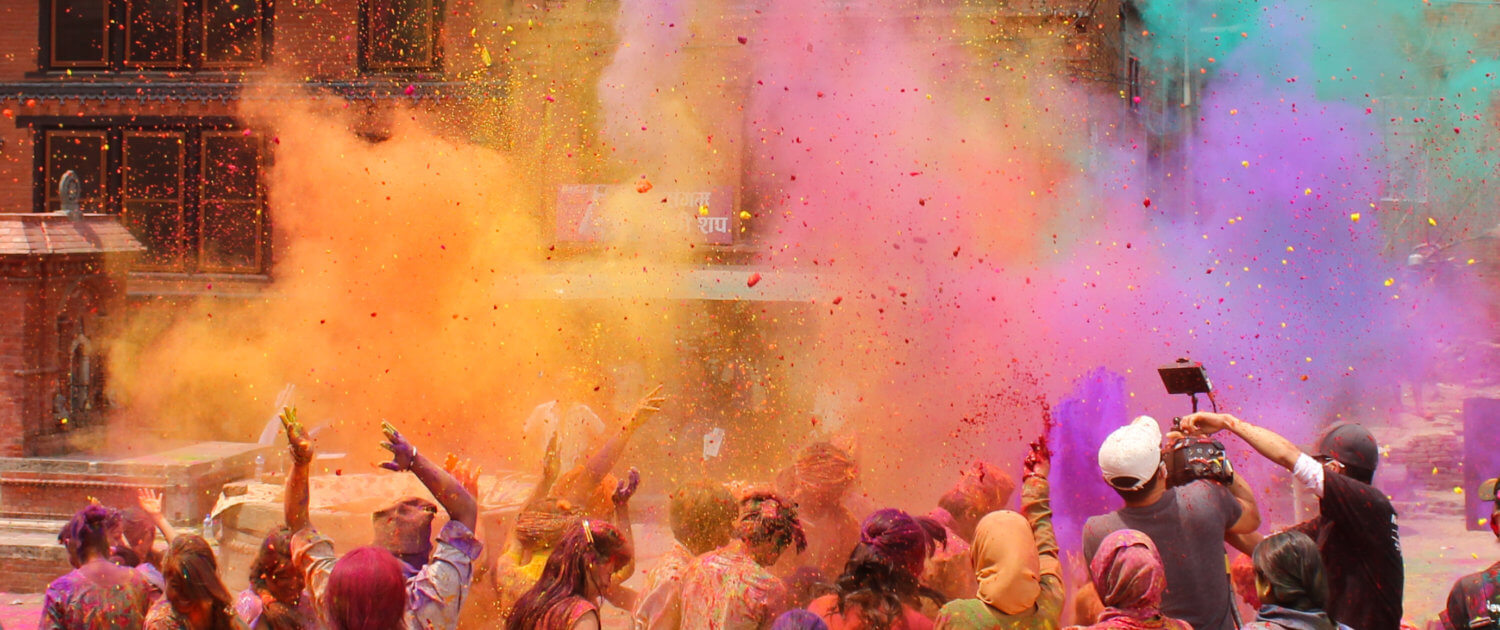
This iconic day is the one most often seen and reported on in news and in films. It’s a day of color and joy when people gather in masses on the streets, as families and in schools, to celebrate. Colorful water balloons, paint, and perfumed powder are thrown on all present – children and adults, women and men. The powdered pigment (called “gulal”) represents the bonfire of the second day. Each color symbolizes a force in life, and therefore color and life are inseparable. For instance, blue is the color of the revered god in Hinduism, Lord Krishna. Green symbolizes new beginnings, harvest, and fertility, and is also the sacred color of the Muslim community. In addition to throwing colored powder, there are feasts, dancing and singing – with everyone wishing each other, a “Happy Holi” – the festival of friendship, Love and new beginnings!
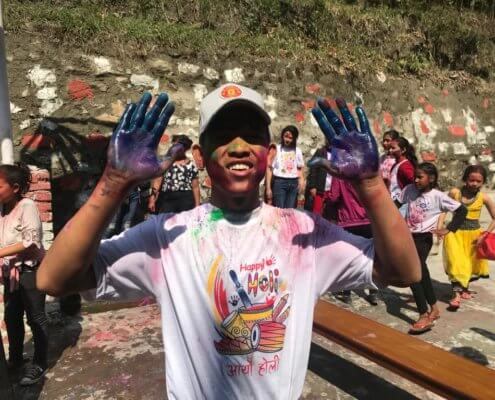
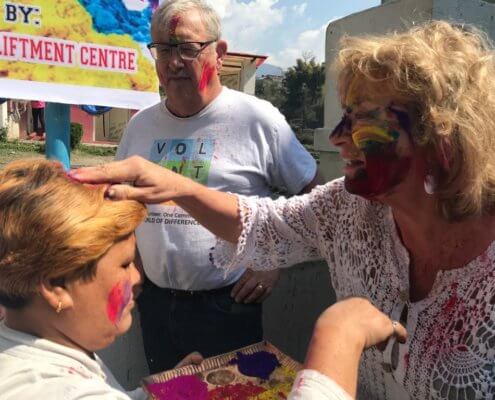
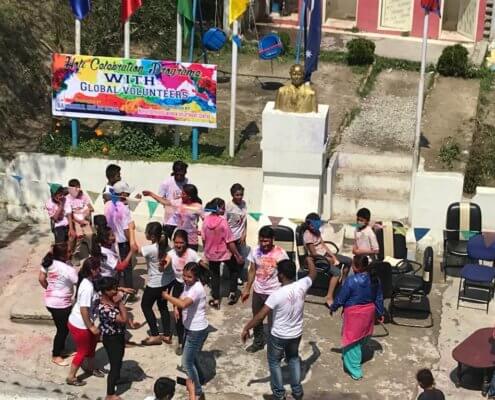
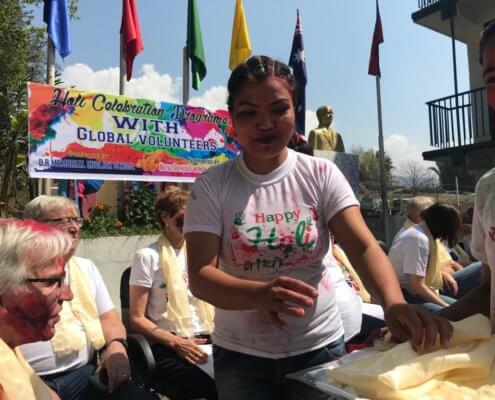
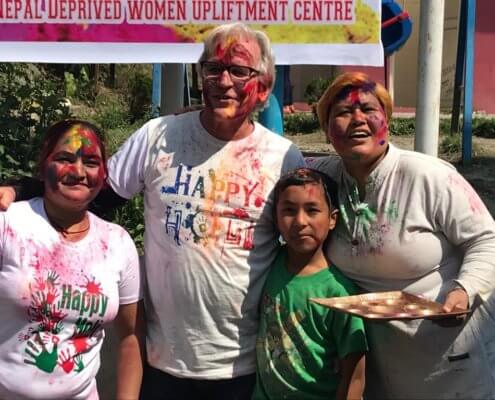
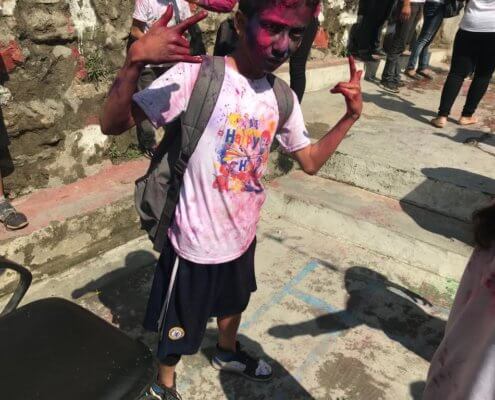
You might also like:
Experience Kathmandu as a Volunteering Destination
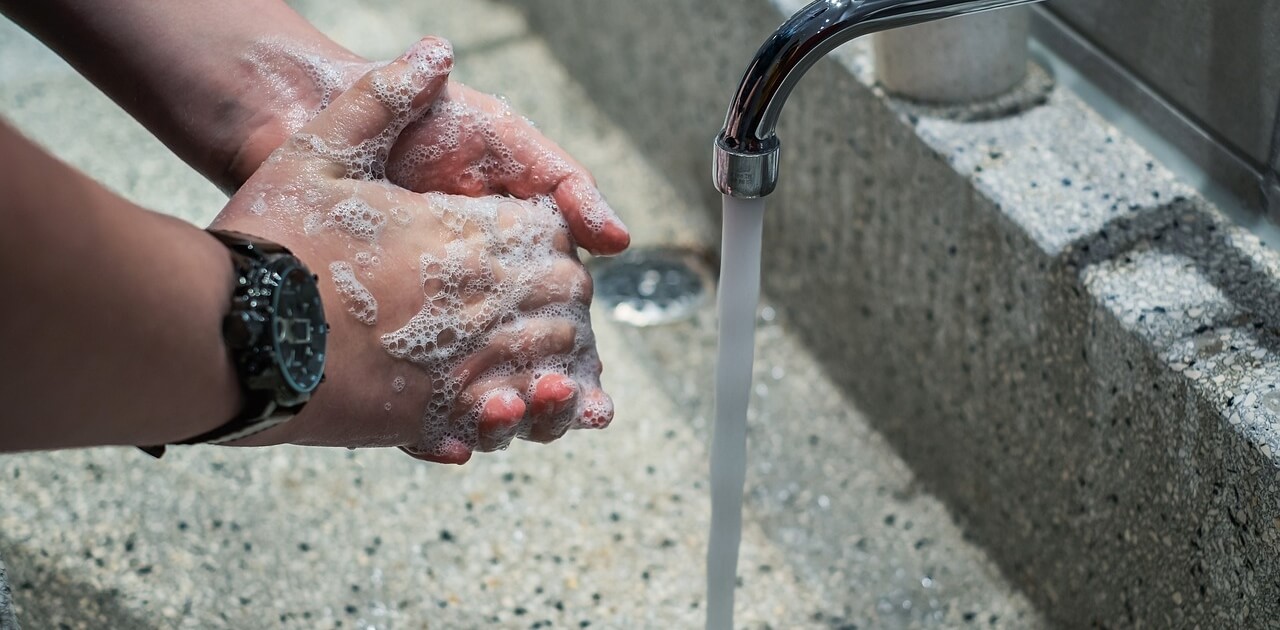
1 year ago
Help Improve Health and Hygiene for Peruvian Children
In the dusty hills of the district of Ventanilla, north of Lima, Peru, the community of Sagrada Familia houses and educates some 250 children living away from their families. During the school year, Sagrada Familia is also a school for more than 1,000 kindergarten, primary, and secondary school students from the surrounding favelas. Part of Sagrada Familia’s compact campus is a clinic that provides health care services to the resident children, students, and neighborhood families. As we introduce the Reaching Children’s Potential Program (RCP) to the wider community of Ventanilla, volunteers present health and hygiene workshops to students and families, emphasizing practical hand washing and disease prevention skills.
It’s rare in the small, remote jungle villages and Andean regions, where many of Sagrada Familia’s children were born, to find a fully equipped bathroom with running water and soap. So, when they come to live in the children’s community, they must learn the practice of hand washing. For the families living in Ventanilla, water is expensive, and available for only a few hours a day. Using both soap and water, therefore, is a habit that the children we serve must learn. Workshops are one tool we use in the standard RCP curriculum, along with classroom discussions on self-care.
Youth are naturally interested in what volunteers teach, and they pay attention to these lessons, say Sagrada Familia staff. Volunteers come across as fun, friendly, and non-judgmental, so it’s easier for the kids to open up to them and ask the questions they hesitate to bring to their teachers and peers.
The Peruvian government began a handwashing initiative in 2003 using public education and media messaging to increase handwashing among mothers and young children in 14 of the country’s 25 regions. The program got a major boost in 2007 when the World Bank’s Water and Sanitation Program and Bill & Melinda Gates Foundation added their resources and know-how through the Global Scaling Up Handwashing Project, an evidence-based program to improve handwashing behavior in real-world settings. Despite these considerable resources, limitations in delivery, commitment, and capacity led the project to fall short of expected results among the target group of mothers, caregivers, and children under 12
The World Bank found greater success with hyper-focused efforts engaging mothers at home teaching the family to wash hands with soap and water before meals, before cooking and after using the toilet. Global Volunteers has learned in Tanzania by providing convenient handwashing stations and liquid soap for every family, and presenting educational workshops to mothers on the importance of hand washing, that the incidence of diarrhea can be rapidly and significantly decreased. With our focus on the first thousand days of life, and reducing childhood stunting, such outcomes are critical for long-term program sustainability, and are transferable to our work in Ventanilla.
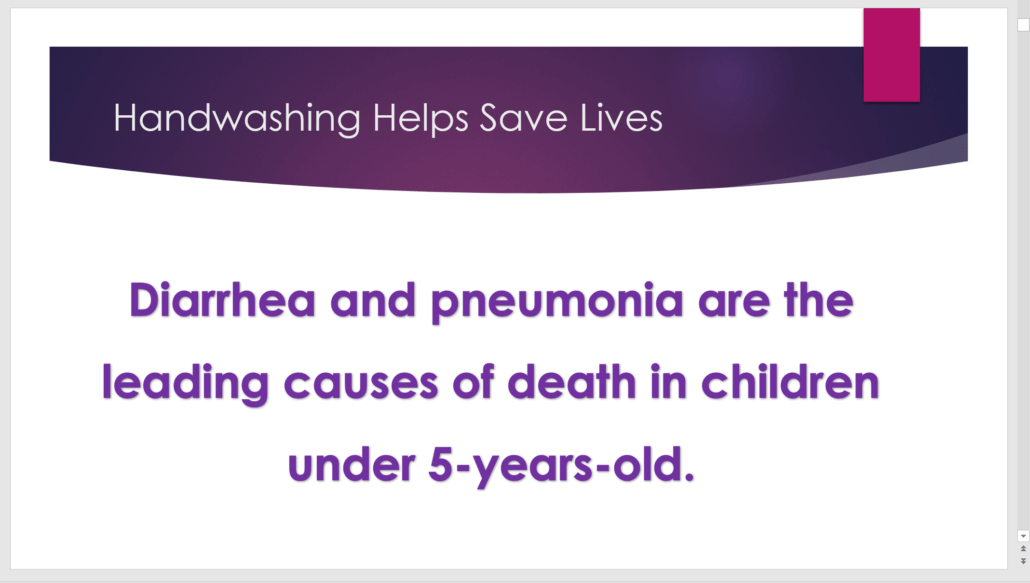
Basic health and hygiene workshops through Global Volunteers’ RCP Program in Peru present the importance of disease prevention and simple daily practices for optimal health. For instance, diarrhea can be reduced by nearly 50 percent and acute respiratory illness reduced by 25 percent through hand washing with soap and water after using the toilet and before eating. This simple practice is, in fact, the most efficient and effective preventative health measure readily available to virtually everyone. From a cost-benefit perspective, washing with soap is three times more effective than building latrines, nearly 60 times as effective as providing clean running water, and more than 300 times as effective as any single immunization.
Students and professionals alike are effective in teaching these basic lessons through Global Volunteers’ prepared health and hygiene workshops in classroom settings. Youth and adults gather for interactive workshops, translated into Spanish, with youth and adults. Volunteers serve as a valuable resource in reinforcing the Peruvian government’s campaign for clean hands, sharing personal and professional knowledge of personal hygiene practices, and answering important questions about integrating good health habits into daily life.
More broadly, we make healthcare volunteers available to discuss health concerns such as anemia, diabetes, and breast cancer of families living in the surrounding neighborhoods. So, instructions on healthy eating habits, stress management, diabetes prevention, and breast self-exams are requested as part of education and treatment of these conditions. Workshops can help prevent and identify various conditions, saving impoverished families the cost of doctor visits and medicine.
Volunteer Coordinators can register you and your traveling companions on a one- or two-week Peru RCP service program to assist with this life-saving project.
Request information to learn more >>Learn more about hand washing here:
Proper Hand Washing Saves Lives Worldwide – How You Can Help